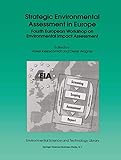Strategic environmental assessment in Europe fourth european workshop on environmental impact assessment Libro electrónico editors: Volker Kleinschmidt, Dieter Wagner
Tipo de material: Libro
en línea Idioma: Inglés Detalles de publicación: Dordrecht Springer science c1998Descripción: vi, 173 páginas diagrs., gráf., mapa centímetrosISBN:
Libro
en línea Idioma: Inglés Detalles de publicación: Dordrecht Springer science c1998Descripción: vi, 173 páginas diagrs., gráf., mapa centímetrosISBN: - 9048151015
- 9789048151011
- 9789401730914 (Online)
- Disponible en línea
Incluye bibliografía
Disponible para usuarios de ECOSUR con su clave de acceso
SEA, in particular, one study which dealt with the I. WORKSHOP OBJECTIVES AND development of an overall research strategy for FINDINGS - INTRODUCTION EIAISEA. 2 On 4th December 1996, the Commission Volker Kleinschmidt & Dieter Wagner, passed a "Proposal for a Council Directive on the PRO TERRA TEAM GmbH / Stadt-und Assessment of the Effects of Certain Plans and Regionalplanung Dr. Paul G. Jansen) Programmes on the Environment". 3 Finally, after years of negotiations, there is a proposal for a SEA Directive which now has to be discussed within the institutions of the European Union and its Member States. The scope of the Potsdam workshop covers 1. INTRODUCTION Strategic Environmental Assessment for decisions above the project level, Le. for plans, programmes and policies. The principal tasks of the workshop Since 1990, the Directorate General XI of the were: European Commission has supported and co • to specify current SEA-related methodologies and ordinated several international expert meetings in procedures, to identify major deficiencies and to the field of "Environmental Impact Assessment". propose means of overcoming these, The participants of these meetings were drawn from • to identify constraints to SEA implementation in ministries, different branches of public administra the Member States and means of overcoming tion, EIA-Centres and research institutes. The par these constraints, ticipants coming from different backgrounds ensured • to identify SEA research and training needs, intensive, interdisciplinary discussions. The previous training methods and means of implementing workshops have focused on the following topics: these. Inglés
Disponible en línea
Disponible en formato PDF


